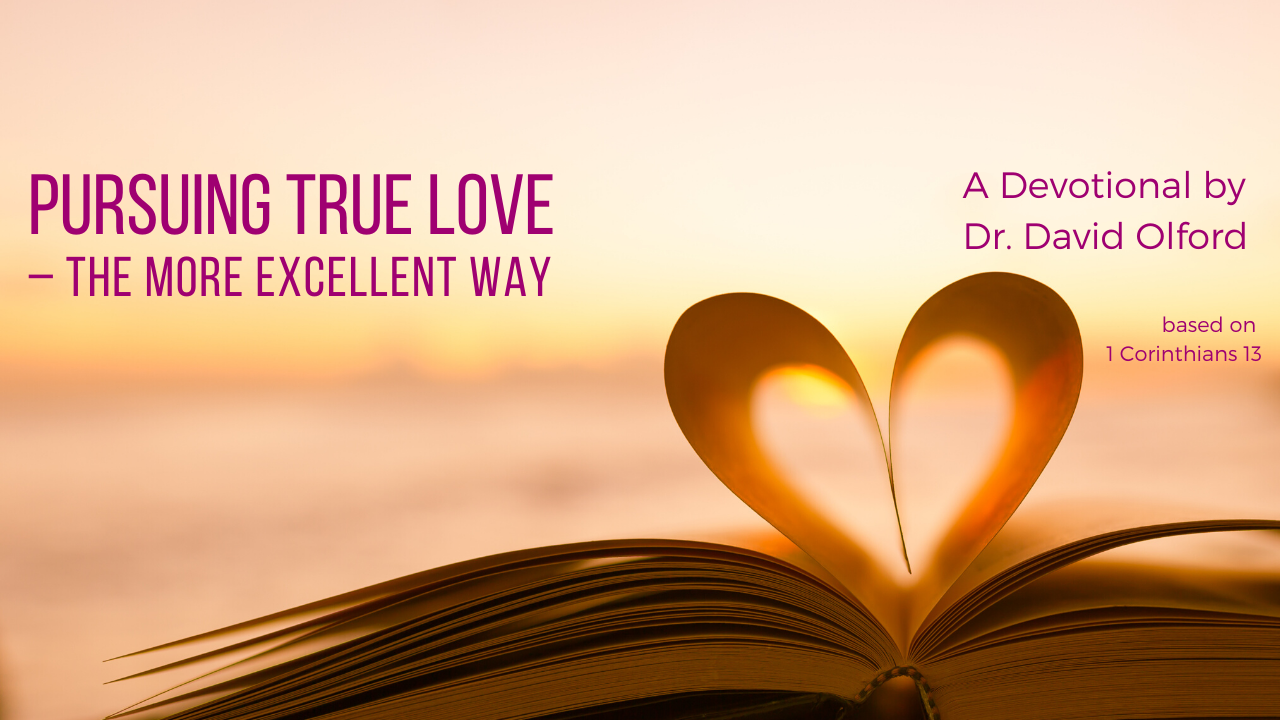Pursuing True Love – the More Excellent Way

OPENING REMARKS: It has been a blessing to see so many acts of love during this Covid-19 Pandemic season. Indeed, without such acts of sacrificial love our communities would be in much greater danger and experiencing much more suffering. It can be seen on a daily basis that the “true love” is the excellent response to the present crisis.
One of the most descriptive and challenging statements concerning the nature of true God-enabled love is written by the Apostle Paul.
TEXT: “…..But the greatest of these is love. Pursue love……” (1 Cor. 13:13b-14:1a, 13: 4-7 NKJV)
INTRODUCTION: The “love” chapter, often read at wedding ceremonies, was not written originally for such an occasion. The Apostle Paul is writing to a gifted church struggling with many issues.
In chapters 12-14, the Apostle addresses issues related to the use of spiritual gifts in corporate gatherings. Paul gets to the heart of the matter when he calls the church to “a more excellent way,” the way of true love. Instead of pursuing the use of one’s gifts for self-promotion or pleasure, the Christian is to be motivated by true love that is selfless and oriented towards others. In short, the need is to pursue true love.
In the specific Corinthian context this meant to pursue gifts, ministries, and practices that would edify others in the most in the life of the church. But, on the way to applying this ‘love dare’ to corporate gatherings, Paul describes love meaningfully and beautifully in the preceding verses.
In verses 1-3, Paul expresses that love is indispensable and essential. In verses 8-13, the Apostle concludes by describing how love is permanent and eternal. In verses 4-7, the Apostle describes the characteristics of love personally and practically, both negatively and positively.
Let’s briefly consider Paul’s description of love in these verses, and I am presenting Paul’s description in terms of a “love commitment” that we need to make.
- True love means saying “No” to a Self-Centered Life (“…… love does not envy, love does not parade itself, is not puffed up; does not behave rudely, does not seek its own, is not provoked, thinks no evil; does not rejoice in iniquity,………”)
Each one of these phrases challenges us to the core. Telling us what love isn’t, makes us very aware of how easy it is to be unloving, and to be self-centered. The Christian is to say “no” to a self-centered life. Envy, pride, rudeness, selfishness, over-sensitivity, and evil thinking-feeling-speaking have no place in the mature believer’s life.
At the heart of the matter is a self-centeredness that tends to see everything in terms of how it affects “ME.” Despite all appearances to the contrary, we can be more concerned about ourselves, our reputation, and our prominence, and these concerns will inevitably lead to not treating others with the degree of love that is Christ-like.
Practically speaking, the life of love calls us to the daily denying of self and self-centered attitudes and actions. As Paul states simply, but powerfully elsewhere, “For even Christ did not please Himself………” (Rom. 15:3). Remember that Jesus came, “not to be served, but to serve, and to give His life a ransom for many” (Mark 10:45).
- True love means saying “Yes” to a Love-Directed Life (“Love suffers long and kind; … rejoices in the truth; bears all things, believes all things, hopes all things, endures all things.”)
It is not hard to see the close connection between the description of love here and Paul’s description of the fruit of the Spirit (Gal. 5:22). When we speak of a “love-directed life” this really means practically that we must live a life dependent on and empowered by the Holy Spirit.
It is a Spirit-filled life that will display true love that is Christ-like and others oriented. The Corinthians may have thought that the primary evidence of the Spirit was seen in the display of gifts. The Apostle’s instruction (which takes three chapters) reveals that the heart of the matter is love, and Paul’s exhortation is to pursue a love that is true, edifying, and others oriented.
In another context the Apostle says, ”Therefore be imitators of God as dear children. And walk in love as Christ also has loved us and given Himself for us, an offering and a sacrifice to God for a sweet-smelling aroma” (Eph. 5:1-2).
CONCLUSION: Pursue true love. This does not mean that we don’t have appropriate desires, like to use our gifts, but it means that these desires must be shaped, guided, and infused with a love that denies self and seeks to edify others in a Christ-like manner empowered by the Holy Spirit.
All Scripture quotations are taken from the New King James Version

